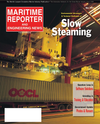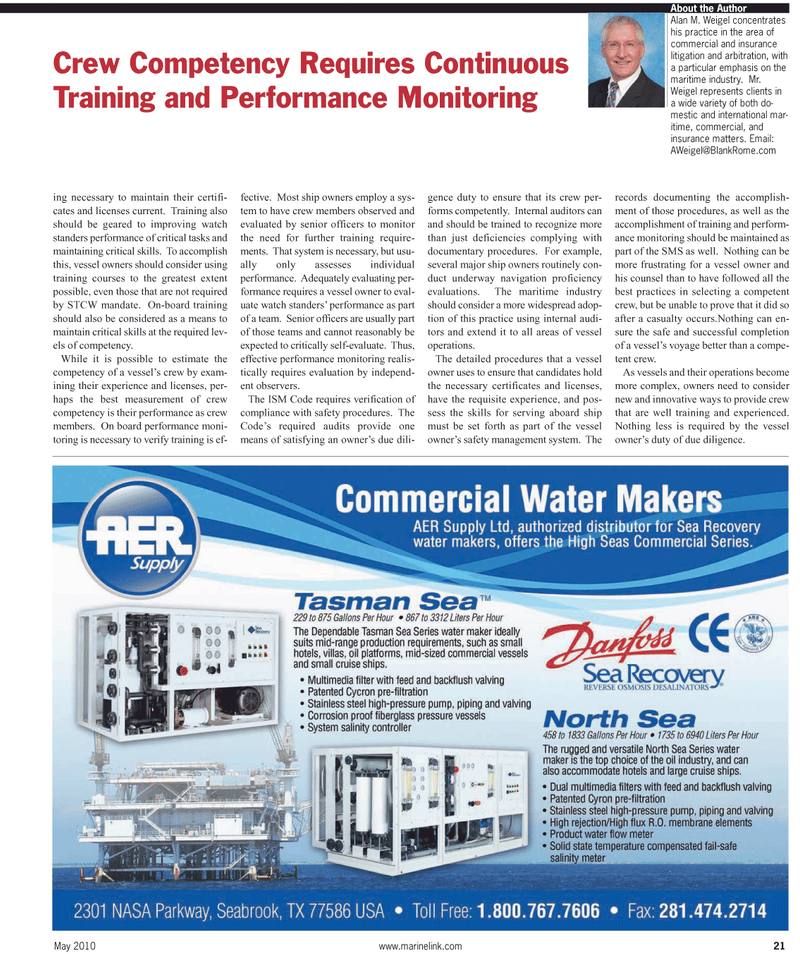
Page 21: of Maritime Reporter Magazine (May 2, 2010)
Read this page in Pdf, Flash or Html5 edition of May 2, 2010 Maritime Reporter Magazine
May 2010 www.marinelink.com 21
About the Author
Alan M. Weigel concentrates his practice in the area of commercial and insurance litigation and arbitration, with a particular emphasis on the maritime industry. Mr.
Weigel represents clients in a wide variety of both do- mestic and international mar- itime, commercial, and insurance matters. Email:
[email protected] ing necessary to maintain their certifi- cates and licenses current. Training also should be geared to improving watch standers performance of critical tasks and maintaining critical skills. To accomplish this, vessel owners should consider using training courses to the greatest extent possible, even those that are not required by STCW mandate. On-board training should also be considered as a means to maintain critical skills at the required lev- els of competency.
While it is possible to estimate the competency of a vessel’s crew by exam- ining their experience and licenses, per- haps the best measurement of crew competency is their performance as crew members. On board performance moni- toring is necessary to verify training is ef- fective. Most ship owners employ a sys- tem to have crew members observed and evaluated by senior officers to monitor the need for further training require- ments. That system is necessary, but usu- ally only assesses individual performance. Adequately evaluating per- formance requires a vessel owner to eval- uate watch standers’ performance as part of a team. Senior officers are usually part of those teams and cannot reasonably be expected to critically self-evaluate. Thus, effective performance monitoring realis- tically requires evaluation by independ- ent observers.
The ISM Code requires verification of compliance with safety procedures. The
Code’s required audits provide one means of satisfying an owner’s due dili- gence duty to ensure that its crew per- forms competently. Internal auditors can and should be trained to recognize more than just deficiencies complying with documentary procedures. For example, several major ship owners routinely con- duct underway navigation proficiency evaluations. The maritime industry should consider a more widespread adop- tion of this practice using internal audi- tors and extend it to all areas of vessel operations.
The detailed procedures that a vessel owner uses to ensure that candidates hold the necessary certificates and licenses, have the requisite experience, and pos- sess the skills for serving aboard ship must be set forth as part of the vessel owner’s safety management system. The records documenting the accomplish- ment of those procedures, as well as the accomplishment of training and perform- ance monitoring should be maintained as part of the SMS as well. Nothing can be more frustrating for a vessel owner and his counsel than to have followed all the best practices in selecting a competent crew, but be unable to prove that it did so after a casualty occurs.Nothing can en- sure the safe and successful completion of a vessel’s voyage better than a compe- tent crew.
As vessels and their operations become more complex, owners need to consider new and innovative ways to provide crew that are well training and experienced.
Nothing less is required by the vessel owner’s duty of due diligence.
Crew Competency Requires Continuous
Training and Performance Monitoring

 20
20

 22
22
